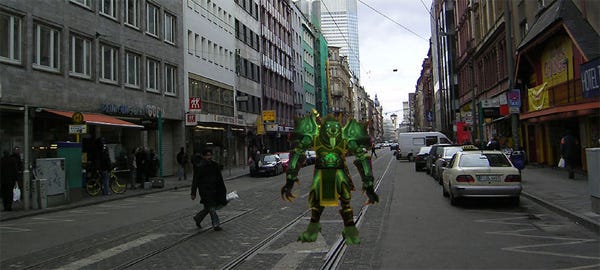Fantasy And Reality: Can Gamers Tell?
For Science!
Did you know that you can't tell reality from fantasy? No, I'm not a twenty-foot dragon from Saturn, silly! I'm a human. But you can't tell. I know this because the Metro told me so. According to the free rag, Nottingham Trent university researchers have revealed that gamers get so immersed in fantasy that they are unable to distinguish the real world. So this must be based on a broad, far-reaching study for the paper to make such a statement, right? No of course not. It's an interview study of 42 people. Which I've now read. And has nothing to do with the Metro's conclusions. So obviously I'm going to take issue with the Metro's coverage, but then get a little bit deeper when taking issue with the paper itself.
I don't mean to get all Ben Goldacre, but the wilful ignorance of newspaper coverage of science stories makes my brain hurt. This tiny proportion of people were selected on the basis of being aged between 15 and 21, and playing more than ten hours of games a week (an epic hour and 25 minutes a day). So not exactly a broad representation of anything, let alone gamers. It is, in fact, a study of teenagers, which doesn't get mentioned anywhere in the coverage.
So let's take a look at these examples of people losing the ability to distinguish reality.
"One 15-year-old named Simon (the names used are not their real names) admitted wanting to use a ‘gravity gun’ from the game Half Life to fetch something from the fridge."
Er. Right. Who wouldn't? I want to be able to fly, or not need to wee. But I'm able to tell that these things aren't possible. There's no evidence shown to suggest that Simon believes that gravity guns are real, because he obviously doesn't.
"Another gamer, Milton, 19, said when he dropped a sandwich after playing Prince Of Persia: Sands Of Time his finger ‘twitched’ as he tried to retrieve it with his console."
Ah, right, that's what they mean.
"Linus, 19, said he thought he could use a search button in World of Warcraft when he tried to look for his older brother in a crowd. Others said they unwittingly acted out situations inspired by games."
In other words, the research has discovered that repeating a task many times in a game means your brain flickers on the idea of doing it in real life. Of course! The number of times my brain has wanted to scroll up and down a magazine page, or been frustrated that wiggly red lines don't appear under spelling mistakes when I'm writing... But I'm fairly convinced I have a reasonable grip on the distinction between reality and fantasy, despite all that word processing I do.
So of course at this point it's time to actually look at the paper from which this is all drawn. And as one of the paper's authors, Dr. Mark Griffiths told us, these papers have their own agenda.
It is, in fact, a study of what they're calling Game Transfer Phenomena (GTP), where elements of gaming are associated with elements of real life, "triggering subsequent thoughts, sensations and/or player actions." These were grouped as either intentional or automatic experiences. The stated goal was not to prove that games are dangerous, but simply to study their Game Transfer Phenomenon with relation to understanding how immersion works.
Those interviewed were 42 Swedes (39 male, 3 female) between 15 and 21, who played a broad range of games regularly. And the incidents of these gaming ideas in their real life are really fun! Like the 19 year old who, when trying to find his brother in a crowd, considered using the /who function. Or the 17 year old who starts seeing walls and buildings as potential routes after playing lots of Assassin's Creed.
Which I think we can all quite anecdotally associate with that feeling of coming out of a big, action film at the cinema, and feeling like you could run incredibly fast, or lift up a car. These gamers report finding themselves looking at real life structures in the same way as they would in-game, looking for weaknesses or sniping points. It then goes on to describe the much-studied "Tetris effect" where you continue to see the shapes and patterns when you close your eyes, or in your dreams. Something that has proven absolutely essential for scientific research into dreaming since the 90s.
Things get more interesting when the paper discusses hypnagogic effects, such as imagining health bars above people's heads, or perceiving dialogue choices when in conversations. Neither of course suggests an inability to distinguish reality from fantasy, but instead makes for interesting study into the way fantasy can augment an understood reality. But then it all starts to look rather trivial again as the study reports examples of teenagers, well, playing. Hiding in a box like Solid Snake, talking like cowboys. Basically normal imitative behaviour.
The paper has a few distinct issues. One being a huge proportion of other papers cited were also co-authored by Griffiths. With an interest in so-called "gaming addiction", for which scant useful evidence actually exists, Griffiths is no stranger to gaming controversies. Although he has also published a number of papers recognising the broad range of benefits of gaming. It also makes rather liberal use of the word "perhaps", every time it wants to make an unsubstantiated claim.
"Today's video games have evolved due to technological advance, resulting in high levels of realism and emotional design that include diversity, experimentation, and (perhaps in some cases) sensory overload."
Regarding the claims of dissociation, the paper itself identifies this as "fuzzy", pointing out that there's "no clear accepted definition of what it actually constitutes." It then goes on to fudge a rather ambiguous association with gaming, seemingly deliberately ignoring the trauma aspects one would more usually associate with dissociative behaviour.
It's also a little troubling that there's a seeming lack of familiarity with the games being discussed. The typographical error, "When just 'Cause 2' got released..." is telling.
But most significantly, and of course a typical flaw in interview-based research, is that the psychological profiles of those taking part were not looked into, let alone taken into account (as the paper goes on to discuss in its discussion). One subject referred to as Linus, aged 19, contributes some of the more extreme responses (such as dancing like a WoW character in his school), and "Carl", also 19, who reports that he has brief urges (on which he does not act) to throw himself down stairways and steal cars. Because only 42 were studied, and because they were selected from Swedish gaming forums without any psychological profiling, such anecdotes are pretty much useless out of context. Perhaps "Carl" does suffer from delusions and dissociation, and games aren't helping him (although the evidence given here suggests not, just that he recalls gaming actions in real life before dismissing them). But we don't know, and there's certainly no proof, nor any attempt to prove, that gaming would be the cause of this. Terms like "intrusive thoughts" - a condition associated with anxiety disorders - are used astonishingly inappropriately here, again without evidence.
The language used also seems to try to create sensation where there is none. In the section on violent reactions in real life, it admits that these are all imagined and not acted on. But almost reluctantly, with language like,
"Violent solutions to real life conflicts appeared to be used by a few of the players, at least in their imaginations."
That's just abysmal phrasing in a scientific paper, almost as bad as the newspapers so lazily misquoting it all. It should more properly read, "Violent solutions to real life conflicts were not used by players, but some imagined doing so."
I also find the paper's use of the word "even" to be extremely unhelpful. Repeatedly it editorialises with this word to imply more than is being reported. For instance,
"Some players reported that their perception of the world had changed, at least temporarily, when they found themselves integrating dangerous scenarios in the real life environment. Most of the time these experiences appeared as a thought, but one player even performed an action to avoid the possible danger."
Again the phrasing sensationalises before admitting the reality. And the use of "even" is entirely unnecessary - this is supposed to be reporting findings, not being astonished by them. And the incident? It's Linus again, who said that he once chose to stick to the path when walking through some woods, because he's "less likely to get attacked my [sic] mobs."
It's also not helpful that they conclude that imagined things were "hallucinations", which is an extremely strong word to describe seeing floating images after staring at a repeated pattern for a long time. Such exaggeration reaches the point of farce when the discussion of uncanny moments of associating games with life is described as opening "a 'Pandora's Box' for some players". Yes, thinking that a street looks a bit like Assassin's Creed is very much the same as unleashing all the evil forces in the universe.
Perhaps the most strange and heavily biased aspect of the study comes in what the researchers choose to dismiss. Gamers reporting to them that they can distinguish reality from fantasy even during the GTP events is dismissed, based on other things the gamers said. Which makes no sense at all. Because the researchers conclude these anecdotes are examples of hallucinations, delusions, etc, with no psychological evidence, it is considered that this contradicts the gamers' statements that they are able to distinguish such moments. Why not the other way around? This is not considered. Nor is the similarity of these effects with watching television or film. Clearly this is a study of gaming, but to not mention that the same effects are commonplace from other media is wilfully ignorant.
Of course the study does go on to list its own flaws, as is only proper. It acknowledges that the sample size was extremely small, and that "the findings cannot be generalized in a mechanical way." It also mentions that the questions used in the interviews (most of which were electronic) "may have influenced the experiences reported by the players and the incidence of certain experiences."
And its final conclusion? "Modern video games' realistic scenarios may trigger associations between the two worlds among some individuals." Aside from the complete failure to explore the concept of "realistic scenarios" at any point during the study, indeed referencing Tetris and Guitar Hero as often as GTA or Assassin's Creed, and that making such a conclusion is mystifying, it's rather important to note that this does not, in any sense, suggest that gamers cannot tell the real world from fantasy, as the Metro newspaper claims.
Of course, it's worth noting the Metro's agenda here. The "Related Items" bar at the side lists the following headlines in order:
"'Call Of Duty makes gamers dumb' says Dishonoured developer"
"Nintendo 3DS 'makes gamers sick'"
"Teenage gamer hangs himself in 'virtual suicide mistake"
It's taking all my strength not to pick apart the nonsense in each of those three stories too. And of course on the other side of the screen are the newspaper's links to its Gamescom 2011 coverage. Gosh, it will eat all of that cake. Perhaps they're best off sticking to reporting how Nic Cage is a vampire.
Then of course there's the Mail's approach to the story, where they use it as proof that GTA caused the killing on that submarine.














